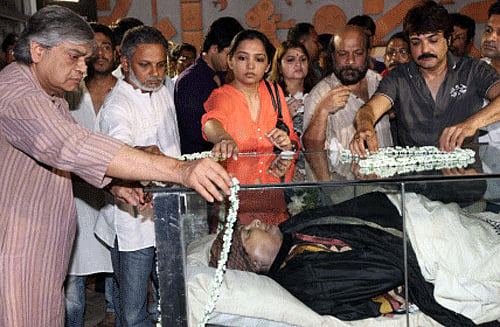
The last time I spoke to Rituparno Ghosh, he was livid over the decision to dub his 2011 Bengali film “Noukadubi” in Hindi and release it as “Kashmakash,” even though he agreed that it was a good marketing move and would increase the film’s reach, taking it to a wider national audience.
“But we’re losing out on the film’s ethnic flavour,” he argued, convinced that his on-screen adaptation of Rabindranath Tagore’s famous novel should be released only in Bengali with English and Hindi subtitles for those not conversant with the language.
On Thursday, May 30, Bollywood’s showman Subhash Ghai, who released the dubbed Kashmakash in Mumbai and Delhi, was mourning the death of one of Bengali cinema’s finest filmmakers. Ghosh suffered a massive heart attack in the early hours of Thursday, just three months short of his 50th birthday on August 31.
Interestingly, battling ill health, Ghosh had finished a project commissioned by the Ministry of Culture on Tagore’s 150th birth centenary. “Jeevan Smriti (Selective Memories)” is a 76-minute documentary on the Nobel laureate, a journey Ghosh intended to take further with a film on the women of the Thakur household. He had admitted that the documentary took him longer to complete than any of his films. “It was almost as if I was alive because I had to complete the project. It's a feeling I've never had before,” he had said. Tagore was a favourite of Ghosh, who took Aishwarya Rai to Bengal with “Chokher Bali” (2003) and whose last release was “Chitrangada” (2012).
His father, Sunil Ghosh, being a documentary filmmaker, it surprised no one when “Ritu” strayed into the world of movies despite an economics degree from Kolkata’s Jadavpur University and a stint as a creative artist in advertising. He started out with a children’s film, “Hirer Angti” (1992). He bagged his first National Award two years later for “Unishe April” (1994), adjudged Best Feature Film. It also won Debashree Roy the award for the Best Actress.
More National Awards followed for “Dahan” (1997), “Asukh” (1999), “Utsab” (2000), “Shubho Mahurat” (2002), “Chokher Bali” (2003), “Raincoat” (2004), “Dosar” (2006), “The Last Lear” (2008), “Shob Charitro Kalponik” (2008), “Abohoman” (2010) and “Chitrangada” (2012). Ghosh also got international recognition at prestigious film fests abroad, including the NETPAC Award in Berlin for “Bariwali” in 2000.
He was nominated twice at Locarno, in 2003 and 2005, for “Chokher Bali” and “Antarmahal” respectively. “Dahan” and “Raincoat” were in contention for the Crystal Globe at Karlovy Vary in 1998 and 2004 and “Chokher Bali” for the Golden Hugo at the Chicago Film Festival in 2003. Ghosh also made his presence felt as an actor, debuting with an Oriya film, “Katha Deithilli Ma Ku (2003)” and acting in two films in 2011, “Arekti Premer Golpo” (Bengali) and “Memories In March” (English), and “Chitrangada” last year, in which he played Rudra Chatterjee, a choreographer grappling with an identity crisis. He also hosted two celebrity chat shows, “Ebong Rituporno” on ETV Bangla and “Ghosh and co.” on Star Jalsha, besides scripting “Gaaner Opare.”
“Jeeven Smriti” is still to release officially and the Tagore film for which he had short-listed Raima Sen and Koel Mallick will remain just a dream now. Just two days before his death, Ghosh wrapped up a crime thriller, “Satyanewshi.” It was his 20th film and stars “Kahaani” (2012) director Sujoy Ghosh as the detective Byomkesh Bakshi.
(The writer is the editor of Blockbuster)
